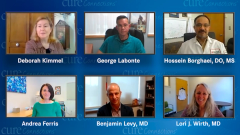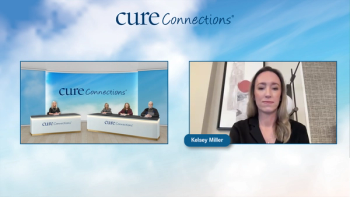
Molecular Testing and Shared Decision-Making
Andrea Ferris, of the LUNGevity Foundation, explains why shared decision-making is important when recommending molecular testing to patients with lung or thyroid cancer and highlights resources provided through her organization that support patients and health care professionals.
Episodes in this series

Lori J. Wirth, MD: One thing I want to add to these thoughts is that with this molecular testing, there isn’t a right answer or a wrong answer. Sometimes we don’t find a mutation that’s going to lead us to one specific drug therapy, but that doesn’t mean that it’s a negative test or that we didn’t get a good answer. It just helps us personalize therapy. We have great treatment options for patients even if we don’t find a particular actionable alteration. In terms of a level setting, the last thing we want to encourage is for people to feel is disappointment if there isn’t a specific actionable alteration on a test. It’s not like that’s a bad answer.
Hossein Borghaei, DO, MS: That’s a great point, and I really appreciate that. Setting expectations is absolutely necessary. Ms. Ferris, let me come back to you. What is a patient’s role in all this? What about the caregiver’s role in asking for molecular testing or questioning? What advice do you provide in that setting?
Andrea Ferris: It’s very important, and it’s incumbent on all of us on this call, to make sure the decision doesn’t sit on a patient’s shoulders to have to ask for a comprehensive biomarker testing. That’s something that we advocate for at LUNGevity, and we’re working to make biomarker testing a standard of care so the patient doesn’t have to ask.
There are also certain people who are more inclined to want to be fully informed, so we provide information to them and questions to ask their doctor. If the patient comes to us or to any of our communities—like our Facebook community—to engage in conversation and doesn’t know if they’ve had comprehensive biomarker testing, we strongly encourage them or their caregiver to ask their clinician if they’ve had it and what the results were, hopefully to ensure that they get it. If their doctor says insurance isn’t going to pay for it or “I don’t know if it’s necessary,” which we’ve heard in the past, then the next step is for the patient to get to a doctor who will do it and who believes in it, because lung cancer requires immediate action. It’s OK to ask for a second opinion and to go to another doctor who’s familiar with these types of tests. If the patient’s insurance isn’t going to pay for it, there are ways out there, and lots of mechanisms to pay for it. That should never be the barrier to having it done. We encourage caregivers to ask these same questions if their person isn’t comfortable in doing so.
This transcript has been edited for clarity.




